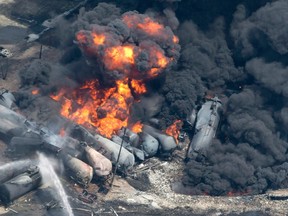Feds won't say how much was paid to protect Ottawa from Lac-Megantic lawsuits

Article content
OTTAWA -- The federal government used taxpayer money to shield itself from lawsuits related to the deadly Lac-Megantic rail disaster -- but it's refusing to say how much it paid.
Ottawa denies any legal responsibility for the fiery 2013 oil-train derailment that killed 47 people, even though it was released from liability by contributing to a $460-million settlement fund for victims and creditors affected by the crash.
At least two of the other 24 other settling parties accused of wrongdoing connected to the accident have disclosed how much it cost them to avoid potential damages and legal fees.
So far, the Liberal government is staying mum.
"That's a classified amount, but we made a contribution because we felt that it was important," Transport Minister Marc Garneau said Wednesday in Toronto when asked about the settlement.
"We don't acknowledge that we had any responsibility; however, we did want to make a contribution because of the impact of this terrible tragedy in Lac-Megantic."
The federal decision to settle may have been made to avoid the cost of fighting the allegations in court. But it also suggests the government was concerned it could have been found liable for damages.
Had it not settled, the Canadian government would have faced numerous lawsuits linked to the crash on both sides of the border, said the U.S.-based bankruptcy trustee for the company at the centre of the crash -- Montreal, Maine & Atlantic Railway.
"None of these things were acts of altruism," said Robert Keach, referring to the 25 parties that paid into the settlement fund.
"They definitely contributed because they were being threatened with legal liability."
Contractually speaking, however, the arrangement explicitly states the settling parties are not acknowledging any liability with their contributions, Keach said in a phone interview from Maine.
"But of course they're paying money."
Garneau met with Lac-Megantic residents Tuesday to mark rail safety week. He heard locals reiterate their long-standing demand for a new bypass route that would steer trains away from the downtown core, part of which was obliterated by the spectacular crash.
Lac-Megantic resident Gilles Fluet said people left the meeting with unanswered questions. Some had also hoped to ask about repairs on the existing tracks.
On Wednesday, Garneau announced Ottawa would allocate $10.9 million to make more than 400 rail crossings safer in Canada.
Bruce Campbell, a visiting fellow at the University of Ottawa's law department, said the government has a responsibility to be more transparent about the disaster and the settlement.
Campbell, who has studied and written about the derailment, noted that Ottawa was open about its $60-million commitment to the town a couple of weeks after the crash.
"This is the taxpayers of Canada that are paying the shot here, but I think, perhaps, the greater obligation is to the people of Lac-Megantic," said Campbell, who's on leave from his role as executive director of the Canadian Centre for Policy Alternatives think tank.
"Whatever (the government) contributed, it's disinclined to admit any role in this, even though I think the Transportation Safety Board did say it played a role, that there was causality there."
The TSB's 2014 report on the accident said Transport Canada failed to recognize MM&A had urgent safety problems and was not following the rules.
It also said the department failed to audit safety procedures at the railway and didn't do enough inspections.
"Who was the guardian of public safety?" Wendy Tadros, the then-head of the TSB, said at the time.
"That is the role of the government -- to provide checks, balances and oversight."
Lisa Raitt, who was Canada's transport minister at the time, responded to the report by saying the government's role in safety was to put the rules in place. The companies, the Conservative minister added, were expected to follow those regulations -- something she said MM&A did not do.
A couple of months later Raitt introduced safety protocols, including stricter hand-brake requirements for parked trains, more research on volatile crude oil and a rule that short-line rail companies, such as MM&A, submit training plans for review.
Transport Canada would also seek 10 new safety auditors across Canada, Raitt said.
Following the derailment, the Canadian government was targeted in lawsuits -- as were about two dozen other parties, Keach said.
Last year, Irving Oil announced it had contributed $75 million to the settlement fund. The train was transporting crude oil to Irving's refinery in Saint John, N.B.
"We fully support the establishment of the fund as an industry-wide response to the tragedy, which will provide substantial payments without further lengthy legal proceedings," Irving said in a March 2015 statement.
World Fuel Services Corp., the U.S. company that owned the oil aboard the train, provided US$110 million.
"We believe that participating in the settlement and contributing to the compensation fund is in the best interests of our shareholders and will also aid in providing closure to those affected by this tragic accident," Michael Kasbar, the company's chairman and CEO, said in a June 2015 statement.










